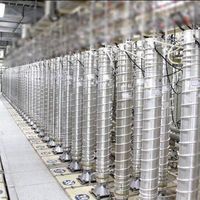Top cleric argues for Iraqi monopoly on arms in rebuke to Iran-linked groups
Iraq’s foremost Shia cleric Grand Ayatollah Ali al-Sistani has urged Baghdad to limit armed power to the government and protect its sovereignty from external interference, in an apparent veiled rebuke of Iran's influence on armed groups.
Meeting Monday with Mohamed al-Hassan, head of the UN Assistance Mission for Iraq (UNAMI), al-Sistani was quoted by the official Iraq News Agency as saying Iraq's progress depends on putting weapons in the state's hands and checking outsiders.
Iraqis must "exert their utmost efforts to overcome their failures, working diligently toward achieving a better future for their country where everyone enjoys security, stability, progress, and prosperity,” INA reported him as saying.
This will be achieved by "preventing foreign interference in all its forms, enforcing the rule of law, restricting arms to the state, and combating corruption at all levels," al-Sistani said, adding: "But it seems that the Iraqis have a long way to go until they achieve this, may God help them."
Al-Sistani is Iraq's preeminent Shia religious authority and an influential voice on public affairs. Along with populist cleric Moqtada al-Sadr, he has been a longtime skeptic of Iranian influence in the country since a US-led invasion in 2003.
However, al-Sistani's 2014 call for armed defense against the expansion of ultra-hardline Sunni Islamic State militants led to the formation of the Popular Mobilization Forces, a grouping of armed factions including some backed by Iran.
His remarks come as Iraq is caught in the middle of broader regional conflicts and hosts US troops at the same time Tehran arms and funds powerful Shia militias.
Iranian-aligned armed groups in Iraq, some of which have publicly expressed support for the so-called ‘resistance axis’ aligned with Gaza, have launched missiles and drones toward Israel, though these attacks have had minimal impact.
The term ‘resistance axis’ was coined by the Islamic Republic to describe its regional proxy forces, including Palestinian militant groups, the Syrian government under Bashar al-Assad, the Lebanese group Hezbollah, Yemen's Houthis and others.
Meanwhile, Shia cleric Ali al-Amin in Lebanon has also called on Lebanese citizens to avoid sectarian divisions and support national unity, asserting that government institutions must protect citizens without partisan or sectarian affiliations.
According to a recent report in The Wall Street Journal, Iran is preparing a retaliatory response to Israel’s latest attacks, potentially involving Iraqi territory as a staging ground and using its conventional military forces.
Iranian officials, briefing Arab diplomats, suggested that their response would focus on Israeli military sites “much more aggressively than last time.”
Iranian President Masoud Pezeshkian also declared that "Iran will in no way leave any violation of its territory and security unanswered."








